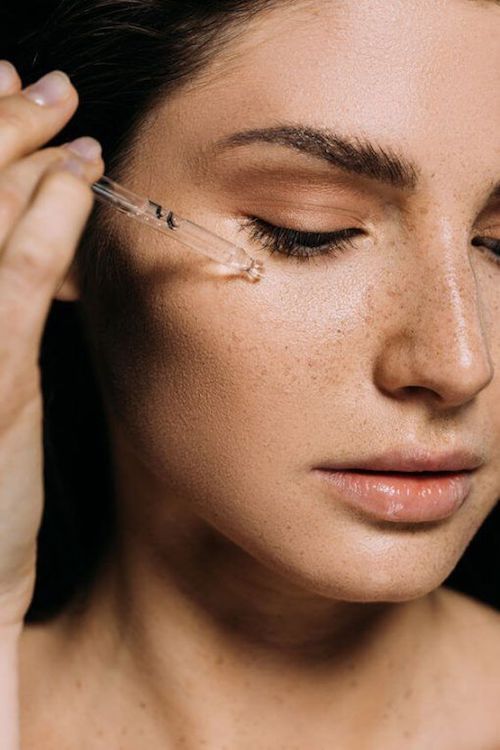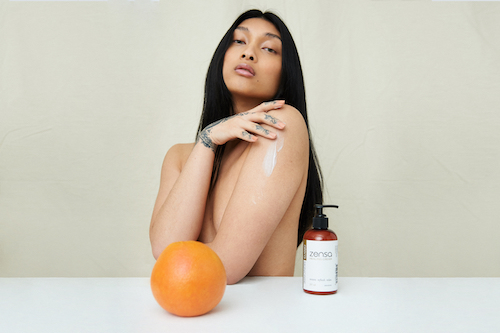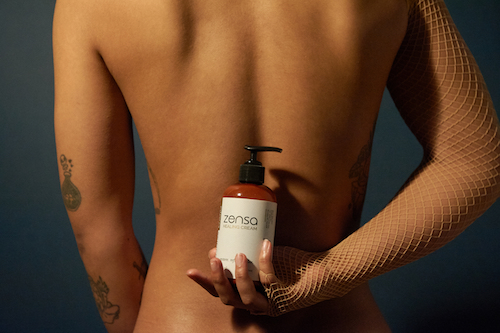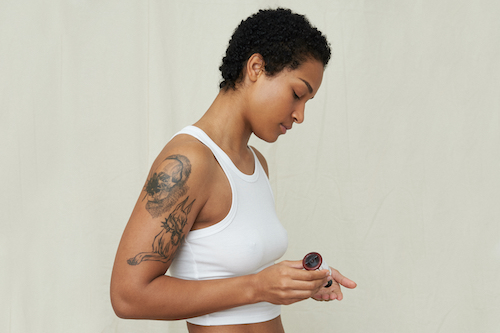8 Top Skincare Ingredients To Help Smooth Textured Skin
8 Top Skincare Ingredients To Help Smooth Textured Skin
Textured skin describes when your skin’s surface feels bumpy to the touch and is often a sign of a congested complexion (clogged pores). Uneven skin texture can appear as dry, flaky patches, inflammatory bumps, fine lines, wrinkles, enlarged pores, or a generally rough complexion. While texture concerns can result in dull-looking skin, don’t confuse uneven skin texture with uneven skin tone – hyperpigmentation, surface-level acne scars, red, blotchy skin, and other changes you can’t feel when running your hand over your complexion.
It can be tricky to determine the exact habit, condition, or product responsible for your rough skin texture. However, most of these external symptoms result from a damaged or impaired skin barrier function. Common causes of textured skin include acne, chronic skin conditions (like eczema or rosacea), sun damage, and dry, dehydrated skin. Determining the cause of your uneven skin texture is the first (and a highly important) step in figuring out the right treatment option(s) and recommended skincare ingredients to try out.
Here’s a rundown of the best skincare ingredients (and natural remedies) to improve grainy, textured skin and how they treat several causes of uneven skin texture to leave you with a smooth, supple complexion.

Credit: Beverly Hills MD/Pinterest
Hyaluronic Acid
This humectant (a substance that absorbs and retains water) is the holy grail for younger, more hydrated, and smoother skin. Hyaluronic acid is a large sugar molecule naturally produced by your body to cushion your joints, eyes, and connective tissues. Around 50% of your body’s hyaluronic acid can be found in the skin. Some of the main skin benefits of hyaluronic acid include its hydrating, anti-aging, and anti-inflammatory properties to smoothen textured skin. The substance binds with collagen to replenish and strengthens the skin barrier to soothe inflammation, heal cracked skin, and increase cellular turnover. This process helps remove dead, dehydrating skin cells more quickly to prevent clogged pores and dry, flaky patches while helping smooth out fine lines or wrinkles for firmer, more supple skin.
A 2014 study found that hyaluronic acid, applied topically, improved skin hydration by up to 96%, skin elasticity by up to 55%, and decreased the depth of wrinkles by up to 40% over an 8-week timeframe.
How To Use Hyaluronic Acid: First, wash your face with a gentle cleanser then apply the hyaluronic acid serum – followed by your moisturizer and sunscreen (at least 30 SPF for the daytime).
Vitamin C
Packed with antioxidants, vitamin C offers several protective and skin-improving benefits, from reducing acne, wrinkles, and fine lines to increasing collagen and elastin production and shielding (or reversing) damage from the sun’s UV rays. A 2008 study found that applying topical vitamin C serum can reduce the appearance of wrinkles and fine lines after just 12 weeks of use.
Topical vitamin C is very acidic, which stimulates your skin’s self-healing process to promote the production of collagen, elastin production, and cell regeneration process. In a 2019 study, researchers found that applying a vitamin C-derived serum improved skin hydration, strengthened the skin barrier, and decreased transepidermal water loss by 19% after 4 weeks of use. These processes increase cellular turnover to naturally exfoliate the skin, leaving you with a plumper, more youthful, smoother skin texture.
When shopping for vitamin C skincare, choose serums over creams or lotions. Look for vitamin C products containing its most potent form (the label will typically say ascorbic acid, otherwise known as L-ascorbic acid). Start with products containing around 10% vitamin C and work your way up to a serum that offers a 15-20% vitamin C concentration. You want to give your skin time to acclimate to the ingredient’s acidity. Using a high-concentration vitamin C product from the beginning could burn or irritate your skin - only worsening your rough skin texture and skin barrier function.

Individuals with dry or sensitive skin should first try out magnesium ascorbyl phosphate serums, a water-soluble form of vitamin C. This formula is less likely to irritate your skin.
Select a vitamin C serum with a 3.5 pH level if you have normal skin, or choose a serum with a 5 or 6 pH level if you have dry or sensitive skin.
How To Use Vitamin C: Use vitamin C in the morning. Wash your face with your cleanser, and follow with a toner (if you use one). Then, apply your vitamin C serum. Complete your routine with a hyaluronic acid serum, your moisturizer, and sunscreen.
Retinol
Retinol is a derivative of vitamin A and is one of the most potent skincare ingredients you can use to smooth textured skin. While vitamin C also improves skin tone and protects against free radical damage, retinol offers more intense skin resurfacing properties. Benefits of retinol include building collagen, reducing fine lines and wrinkles, and promoting cellular turnover. The increase in cellular turnover exfoliates off any dead skin cells and unclogs pores to reduce flaky patches, acne, and bumpy skin texture – helping to keep your skin hydrated and reduce inflammation. Retinols are an effective option for oily and acne-prone skin to keep sebum production under control and reduce pore size to prevent future breakouts.
While retinol offers powerful results, it can be harsh on your skin. Common side effects from retinol include redness, irritation, and dry, itchy skin (Retinol can temporarily compromise your skin barrier).
If you have dry, sensitive skin, be cautious when adding retinol into your routine. Apply your moisturizer first before using a pea-sized amount of retinol. For all skin types, it’s important to ensure your skin is well hydrated when first using retinol.
How To Use Retinol: Always use retinol at night. First, take off any makeup, and wash your face with a cleanser. Proceed with toner, serums, and eye cream. Then, apply a pea-sized amount of retinol throughout your face. Follow up with a moisturizer. Retinols make your skin more sensitive to the sun, so always apply sunscreen the following morning.
Calendula Oil
Calendula oil, extracted from marigold flowers, is an essential oil known for its anti-inflammatory and protective properties to treat common skin issues that cause textured skin. It contains antioxidant-rich flavonoids and saponins to boost your immune system, skin hydration, and stimulate collagen production. Collagen production increases cellular turnover to exfoliate any dry patches and cleanse pores for a more even skin texture. These anti-inflammatory benefits of calendula oil can reduce acne, allergic reactions, rashes, and symptoms associated with chronic skin conditions, like eczema and psoriasis. Calming these symptoms can help reduce any bumpy skin texture.
We use calendula oil in our Zensa Healing Cream, combined with sunflower seed oil, grapefruit seed essential oil, shea butter, cucumber extract, aloe vera (all packed with vitamins A, C, and/or E), and hyaluronic acid, among other nourishing ingredients. Our formula is designed to hydrate, soothe, and stimulate the skin’s self-healing process to reduce itching, relieve dry skin or symptoms of eczema and similar inflammatory conditions, and accelerate wound-healing during the tattoo after-care or permanent makeup recovery process.
Calendula oil provides antimicrobial, anti-bacterial, and wound-healing properties to prevent breakouts, skin irritation, or infection that can be painful or cause textured skin. The botanical oil contains linoleic acid (vitamin F), which is rich in vitamin E, strengthens the skin barrier, and prevents transepidermal water loss to leave you with more hydrated skin. Calendula also offers sun protection – equivalent to SPF14 – for additional protection against UV rays on top of your regular sunscreen to prevent skin aging, dehydration, and thinning skin texture.

Calendula oil is typically found in moisturizers, creams, or serums. You can also put a few drops of calendula oil into your regular moisturizer.
How To Use Calendula Oil: For everyday use, rash, or eczema treatment, wash your skin as normal with a cleanser or body wash. Apply any toner, serums, and face oil. Follow up with a moisturizer (and sunscreen in the morning). For tattoo after-care or permanent makeup healing, follow your expert’s instructions. Often, you will want to apply a thin layer of a product like Zensa Healing Cream at least twice a day after cleansing. Moisturize as needed.
Salicylic Acid
Salicylic acid, extracted from willow tree bark, is a popular type of beta-hydroxy acids (BHAs), a group of chemical exfoliants. The main benefits of salicylic acid include its exfoliating dead skin cells, softening the substance trapped inside and unclogging pores, minimizing pore size, reducing breakouts, and its anti-inflammatory properties, which remove excess oil and control acne (whiteheads, blackheads, papules, nodules, etc.). Salicylic acid is best suited for oily or combination skin. This ingredient can be too harsh and cause redness or irritation for people with dry, sensitive, or eczema-prone skin. It is oil-soluble, meaning the ingredient can break down your skin’s oils to unclog pores, resurface, and smooth out inflamed, textured skin.

Credit: The Klog/Pinterest
BHAs, like salicylic acid, make your skin more sensitive to the sun, so make sure to apply sunscreen every day when using these ingredients. Salicylic acid is often found in toners, spot treatments, and certain cleansers designed for acne-prone or oily skin.
How To Use Salicylic Acid: First, wash your face with a cleanser. Then, apply your toner, followed by any serums (like niacinamide or hyaluronic acid), and a salicylic acid-containing spot treatment. Finish your skincare routine with your moisturizer, sunscreen (in the morning), and retinol (at night, if you use one).
Glycolic Acid
Glycolic acid, derived from sugar cane, is a type of alpha-hydroxy acid (AHA), a group of water-soluble chemical exfoliants. It is a humectant (like hyaluronic acid) and has the lowest molecular weight among the commercial AHAs available. This smaller molecule size allows glycolic acid to more deeply penetrate the skin than other AHA ingredients, like lactic acid (a great alternative to glycolic acid for individuals with dry, sensitive skin types). Glycolic acid smoothes textured skin due to its exfoliation, hydration, and collagen-stimulating benefits. It removes dead skin cells and attracts moisture to the skin, relieving symptoms of dry skin like flakiness or scaly patches. Glycolic acid stimulates collagen production to resurface the skin, reduce the appearance of fine lines and wrinkles, and unclog pores to control acne or prevent future breakouts. Other benefits of glycolic acid include reducing hyperpigmentation and brightening dull or uneven skin tone.

Credit: @jesshunt2 via @zensaskin/Instagram
Because glycolic acid is a humectant, it helps increase the absorption of other skincare products into your complexion for overall smoother and healthier skin. Glycolic acid is best suited for oily, combination, acne-prone, and normal skin types. If you have dry or sensitive skin, glycolic acid could cause unpleasant side effects like redness or irritation. Glycolic acid is typically found in cleansers, toners, and masks or facial peels (for weekly use).
How To Use Glycolic Acid: Always use glycolic acid at night. Remove your makeup, and wash with your cleanser. Follow up with a toner and any serums. Complete your nighttime skincare routine with a moisturizer.
Niacinamide
Niacinamide, otherwise known as vitamin B3, is a water-soluble ingredient best known for its skin restorative, anti-aging, hydration, and anti-inflammatory properties. This nutrient helps lock in moisture and hydrate rough, flaky patches for smoother skin texture. Niacinamide strengthens the skin barrier to reduce symptoms from eczema, rosacea, and psoriasis and smooth out the bumpy textured skin that often accompanies these inflammatory conditions. It minimizes pore size, regulates oil production, fights inflammatory acne, prevents future breakouts, and reduces the appearance of wrinkles and fine lines to improve textured skin.

Vitamin B3 is a great option for nearly all skin types, including acne-prone, dry, sensitive, eczema-prone, or mature skin. Niacinamide also offers other skin benefits including brightening and evening skin tone, reducing hyperpigmentation, and protecting against (or reversing) damaged cells from the sun’s UV rays or other oxidative stressors. Niacinamide is typically found in serums, moisturizers, and deep-hydration masks.
How To Use Niacinamide: Niacinamide can be used twice a day – in the morning and at night. First, cleanse and use your toner on your face before applying a niacinamide serum. Lock it in with a moisturizer. Follow up with sunscreen during your morning skincare routine.
Ceramides
Ceramides make up around 50% of the lipid barrier that fills the gaps between your skin cells to protect the stratum corneum (outermost layer of your epidermis). While, like collagen, your body produces ceramides, this process naturally slows down with age. Fewer ceramides in the skin correlate with skin barrier dysfunction and inflammatory conditions like eczema, acne, and rosacea – which causes uncomfortable symptoms like itching, redness, and textured skin.
Ceramide skincare products restore and strengthen the skin barrier. Improving skin barrier function helps your skin retain moisture, prevents transepidermal water loss, rehydrates and plumps the skin, protects against outside irritants, and reduces signs of aging. Visible benefits of using ceramides include healing cracked, flaky, or dry, itchy skin, less fine lines and wrinkles, and thicker, younger-looking, and softer skin texture.
While suitable for most skin types, ceramides are practically made for dry or mature skin. However, individuals with sensitive, acne-prone, or oily skin can still use ceramides – just look for oil-free serums and lightweight moisturizers instead of thick creams or lotions.
How To Use Ceramides: Apply ceramides both in the morning and at night. Cleanse, tone, and apply serums to your face. Follow up with your moisturizer (the step that will typically include ceramides). Finish your morning routine with SPF for a skin-healing start to your day.




